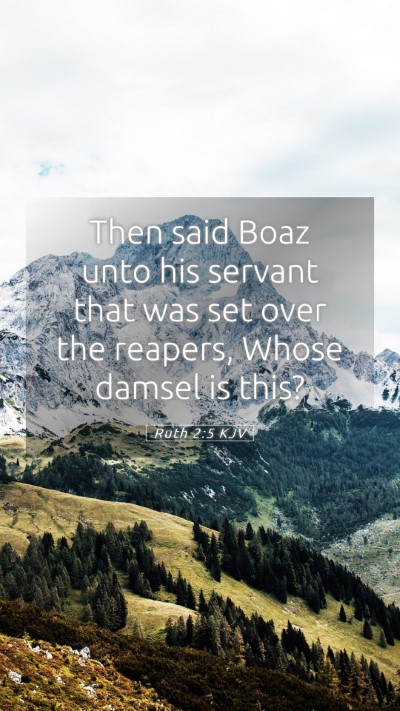Old Testament
Genesis Exodus Leviticus Numbers Deuteronomy Joshua Judges Ruth 1 Samuel 2 Samuel 1 Kings 2 Kings 1 Chronicles 2 Chronicles Ezra Nehemiah Esther Job Psalms Proverbs Ecclesiastes Song of Solomon Isaiah Jeremiah Lamentations Ezekiel Daniel Hosea Joel Amos Obadiah Jonah Micah Nahum Habakkuk Zephaniah Haggai Zechariah MalachiRuth 2:5 Meaning
What is the meaning of Ruth 2:5?
Then said Boaz unto his servant that was set over the reapers, Whose damsel is this?
Ruth 2:5 Bible Verse Meaning
Ruth 2:5 - Bible Verse Meaning and Commentary
Verse Context: Ruth 2:5 states: "Then said Boaz unto his servant that was set over the reapers, Whose damsel is this?" This passage marks a pivotal moment in the Book of Ruth, where Boaz, a wealthy landowner, notices Ruth, a Moabite widow, who is gleaning in his fields.
Understanding Scripture
This verse highlights several key themes relevant to biblical scholarship and understanding. When Boaz inquires about Ruth, it reveals his notice of her presence and a sense of curiosity about her background, emphasizing the importance of individual stories and connections in the biblical narrative.
Bible Verse Interpretations
- Boaz’s Role: Boaz serves as a figure of God’s providence and kindness. His question signifies the beginning of a divine interaction that will lead to significant blessings for Ruth.
- Ruth’s Identity: By portraying Ruth as a "damsel," the text highlights her youth and vulnerability, as well as her status as a foreigner, which carries social implications in the context of Israelite society.
- Personal Attention: The attention Boaz gives to Ruth serves as an example of personal kindness and grace. It demonstrates how God sees individuals who may feel marginalized or overlooked.
Bible Study Insights
The inquiry made by Boaz serves as an invitation for deeper exploration into Ruth's character and the circumstances that led her to this moment. This verse encapsulates the themes of loyalty, redemption, and community.
Commentary from Public Domain Sources
Matthew Henry: In his commentary, Henry emphasizes the significance of Boaz's inquiry. He notes that it reflects not just curiosity, but a growing sense of interest that would later unfold into compassion and care for Ruth. This inquiry marks the beginning of what will become a redemptive relationship.
Albert Barnes: Barnes points out that Boaz’s actions demonstrate an example of good leadership and community responsibility. He is attentive to his workers and those who come to glean, showing that leaders must exhibit awareness of their surroundings and the needs of individuals.
Adam Clarke: Clarke reminds readers of the cultural backdrop of the story. He explains that Ruth, as a Moabite woman, was often viewed with suspicion, yet Boaz’s question serves to elevate her status in the community, hinting at the larger themes of acceptance and inclusivity present in the larger biblical narrative.
Significance of Ruth's Character
Ruth’s determination and loyalty are essential components of her identity. Her actions preceding this verse set the stage for the unfolding events that symbolize faithfulness and the unfolding of God’s providential hand in human lives.
Related Bible Cross References
- Matthew 1:5 - The genealogy of Jesus, emphasizing Ruth's integration into the lineage of Christ.
- Deuteronomy 24:19-22 - The law regarding gleaning, illustrating the context of Ruth's actions and the provision for the poor.
- Proverbs 31:24-25 - Highlighting the attributes of a virtuous woman, paralleling Ruth's characteristics.
Application of Ruth 2:5 to Daily Life
This verse encourages believers to recognize the importance of seeing others and the potential stories they carry. In our lives, we can apply this principle by paying attention to those who might be overlooked and offering support and compassion.
In-Depth Bible Verse Analysis
In analyzing Ruth 2:5, one might consider the implications of identity and belonging. Boaz’s recognition of Ruth implies an acceptance that transcends cultural barriers, encouraging readers to also embrace diversity and be mindful in their interactions with others.
Conclusion
Ruth 2:5 serves as a rich verse for Bible study and interpretation. It opens the door to understanding the themes of providence, kindness, and acceptance that resonate throughout the entirety of Scripture. By diving deeper into each element of this verse, believers can gain valuable insights applicable to both personal growth and community engagement.


